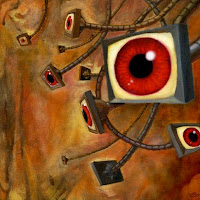
10. Fahrenheit 451 by Ray Bradbury
Fahrenheit 451 is a bleak vision of a future where literature and free thought are outlawed. In Bradbury’s macabre world fireman don’t fight fires, they start them to burn books. Originally serialised by Playboy, Fahrenheit 451 attacks state censorship and explores the value of literature and the effects of television and mass media on reading.
9. The Road by Cormac McCarthy
The Road charts the journey of an unnamed father and son in a post-apocalyptic world. The anonymity of the characters focuses attention on their struggle for survival whilst the unspecified disaster – climate change, nuclear fall-out or natural disaster – leaves the reader intrigued. The delicate use of language contrasts to some of the shocking events within the book whilst themes focus on courage, love, hatred and despair.
8. A Very British Coup by Chris Mullin
Although A Very British Coup’s dystopian credentials can be questioned, the frightening mobilisation of the conservative establishment against the democratically elected working-class Prime Minister Harry Perkins draws alarming parallels with contemporary politics. Many of the issues raised – a reactionary and ubiquitous civil service coupled with an all-powerful self-interested media – resonate with the politics of today. The novel may lack the violence of other dystopian novels, but it certainly feels the most real – and it makes you wonder whether a progressive or socialist government would ever be allowed to exist.
7. The Day of the Triffids by John Wyndham
The Day of the Triffids expresses many of the political concerns of the early 1950s – the Cold War, the fear of biological warfare, the man-made holocaust – but it is the issues of environmental sustainability and genetic modification which echo today. Wyndham skilfully creates a hugely compelling post-apocalyptic world of anarchy, violence and love. With much of humanity condemned to terminal blindness, what is the biggest threat to survival –the terrifying flesh-eating triffids or the self-destructive nature of mankind?
6. A Clockwork Orange by Anthony Burgess
A Clockwork Orange is the tale of tearaway teenager Alex who spends his time tormenting society with ultra-violence. The book explores the machinations of a totalitarian police state and asks how far the establishment will go to enforce law. Written from Alex’s perspective, Burgess adopts a futuristic slang based on Russian dialect which – although initially confusing – serves to pacify the incessant violence. Burgess’ genius lies in his ability to make Alex sympathetic in contrast to the brutal state.
5. The Trial by Franz Kafka
The Trial is the chilling tale of a senior bank clerk, Josef K, who is arrested and prosecuted by an inaccessible labyrinthine judiciary. The nature of the crime is never revealed to K, but still he must blindly build his defence against the omnipresent bureaucratic monolith. The plot and Kafka’s writing style creates a tense and confused atmosphere reflecting the mental state of the protagonist. The hellish nightmare is festooned with mysterious dead ends and wonderfully surreal characters whilst the conclusion is powerfully harrowing.
4. Brave New World by Aldous Huxley
Brave New World is a satirical tour de force with numerous references to classical literature, Soviet communism and American consumerism. It is overflowing with time-honoured dystopian themes – the dangers of an all-powerful state, the incompatibility of truth and happiness, consumerism and alienation. The central theme, however, is the use of technology to control society – particularly reproduction – and the stark chasm between technological advancement and personal fulfilment.
3. We by Yevgeny Zamyatin
George Orwell’s Nineteen Eighty-Four owes much to the plot, theme and characters of Zamyatin’s masterpiece. We tells the tale of one man’s struggle against an omniscient and omnipotent dictator. Printed in 1920s Russia, Zamyatin’s all-powerful Benefactor is a chilling foreshadow of Stalin’s totalitarianism. It is the archetypical dystopian novel and is a resounding champion for individual freedom.
2. Animal Farm by George Orwell
Animal Farm is an accessible and enthralling political fable about a workers’ revolution gone wrong. Orwell’s allegory is a razor-sharp satire on Soviet Russia as the oppressed animals of Manor Farm overthrow their human overlord only to succumb to the same laws of prejudice and hierarchy. The story is overflowing with beautifully crafted characters – from the inspirational Stakhanovite workhorse Boxer to the terrifying Stalinist pig Napoleon. Animal Farm is hilarious and poignant in equal measure. All dystopian novels are equal, but some dystopian novels are more equal than others...
1. Nineteen Eighty-Four by George Orwell
Nineteen Eighty-Four is consistently recognised as the definitive dystopian novel. Orwell skilfully explores how a totalitarian government can manipulate the populace by re-writing history, manufacturing news and waging perpetual war. Many of its themes and phrases – Big Brother, Orwellian nightmare, Thought Police, Room 101 doublethink and newspeak – are in common parlance today whilst its themes of media control and perennial war remain hugely relevant. This novel is doubleplusgood.


No comments:
Post a Comment